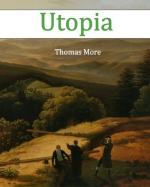|
|
Utopia Author/Context
Thomas More was born in 1478 in London. He was the son of Sir John More, a judge. More studied at St. Anthony's school, followed by Canterbury College in Oxford. His father allowed him to attend Oxford at the persuasion of a friend, since More seemed talented enough. When More started to enjoy himself too much at college, his father had him return to London, where he attended law school at the New Inn. At the same time, More continued his Greek studies with his teachers--Linacre, Grocyn and Colet--and also expanded his knowledge of philosophy, literature and theology.
More became a successful lawyer, and was invited to read the law at Furnicall's Inn. This was considered a great honor, especially for someone as young as More. At this time, More was leading a religious life. However, at age 25, he decided he did not want to live in a monastery, but rather to have a family and live in the city. At 26, he was elected to parliament. At 27, he married Jane Colt. He had four children in the next five years. When More was 33, Jane died, leaving him with four children and an intense law career. He married again, as he knew that this was what was best for his children. His new wife, Alice Middleton, was nothing like him, but he knew her well, and she was an excellent housewife who was six years older than him.
Being incredibly intelligent and charming, More was one of the best lawyers in London, and was chosen to handle many cases in foreign countries. At 32, he became a judge, a position that made him well-known and loved in London. At the same time, More was also engaging himself in literature and philosophy. His masterpiece, Utopia, was written as this time, and is considered to be one of the greatest Socratic dialogues of all time.
After fifteen years of living a comfortable, prosperous city life as a regular citizen, the king called on More's service. This was a position More did not want, as he thought the political life was dangerous and he valued free time for his family and writing more than public service. He also knew that by joining the public service, he would be taking a considerable pay cut. Yet More considered it his duty, as a good citizen, to serve his country.
More became Henry VIII's good friend and personal secretary; and finally became Chancellor in 1529 (he was 51). At this point, he concentrated on two issues: improving the judicial system, and correcting harmful errors of the state and church. However, More spent most of his time doing his job as 'chief justice of the land', where he reformed the legal system. More resigned his position as Chancellor on May 16, 1532, the day after the king and Cromwell convinced the parliament to take away the freedom of the Church. He was then imprisoned in the Tower of London for fifteen months before being executed on July 6th, 1535. This could have been prevented had he signed an oath accepting King Henry VIII as Supreme Head of the Church in England.
Utopia was printed in Louvain, Belgium in 1516. More was afraid of printing it in England because it clearly mocked English policy.
Bibliography
Ackroyd, Peter. The Life of Thomas More. Doubleday, Random House: 1998.
More, Thomas. Utopia. New York: Dover Publications, Inc.: 1997.




